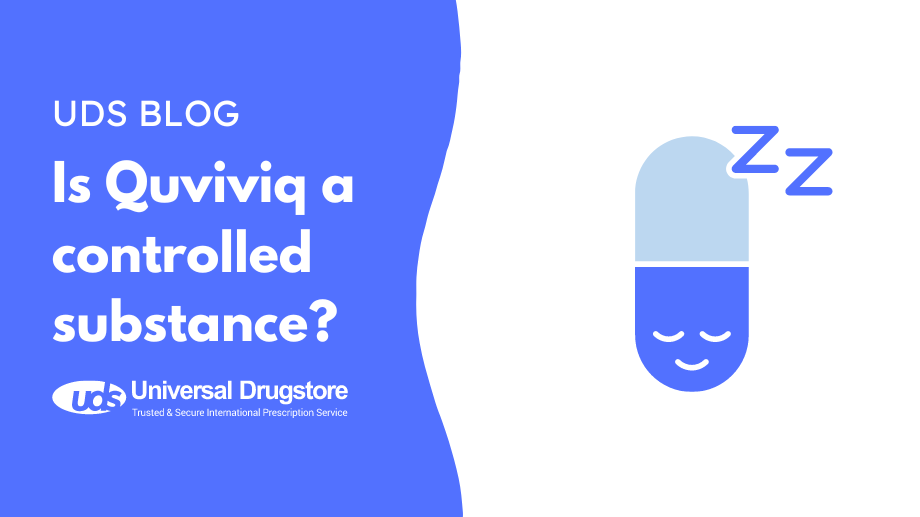Is Quviviq a controlled substance?

In January 2022, the FDA approved Quviviq (daridorexant), a new treatment for insomnia developed by Idorsia Pharmaceuticals. Unlike older sleep medications like Ambien (zolpidem), Quviviq doesn’t sedate the brain but instead targets wakefulness by reducing overactive wake signals.
Quviviq is classified as a Schedule IV controlled substance under the Controlled Substances Act (CSA). This classification indicates that the medication has a lower potential for abuse and dependence compared to drugs in Schedules I–III. Although it’s a controlled substance, clinical trials did not show evidence of dependence or withdrawal. However, ongoing research may further clarify its long-term safety profile.
Quviviq FAQs
How does Quviviq work?
Quviviq contains daridorexant, a dual orexin receptor antagonist (DORA). Other DORAs include Belsomra (suvorexant) and Dayvigo (lemborexant). These medications block the activity of orexins, neuropeptides that promote wakefulness, helping you fall asleep faster and stay asleep longer.
What is Quviviq used to treat?
Quviviq is FDA-approved to treat adults with:
- Sleep onset insomnia – difficulty falling asleep
- Sleep maintenance insomnia – difficulty staying asleep
Your doctor may prescribe Quviviq if you experience one or both types of insomnia.
What are the side effects of Quviviq?
Common side effects observed in clinical trials include:
- Headache
- Sleepiness or fatigue
- Dizziness
- Nausea
Rare but serious side effects may include:
- Severe allergic reactions – hives, facial swelling, trouble breathing
- Complex sleep behaviors – such as sleepwalking, sleep-driving, or sleep-eating
- Daytime drowsiness – may impair driving or machinery operation
- Suicidal thoughts, depression, or mood changes
- Sleep paralysis, hallucinations, or cataplexy-like symptoms
- Breathing issues – especially in people with COPD or sleep apnea
This is not a full list. Report side effects to your healthcare provider or to the FDA at 1‑800‑FDA‑1088 or www.fda.gov/medwatch.
Are there any drug interactions with Quviviq?
Quviviq can interact with many medications, including:
- Other sleep aids like Ambien (zolpidem)
- Benzodiazepines (e.g., alprazolam, diazepam)
- Opioids (e.g., oxycodone, hydrocodone)
- HIV medications (e.g., indinavir)
- Antifungals (e.g., itraconazole, ketoconazole)
- Antibiotics (e.g., clarithromycin, ciprofloxacin, rifampin)
- Seizure drugs (e.g., phenytoin, carbamazepine)
- Muscle relaxants (e.g., baclofen, cyclobenzaprine)
- Antidepressants (e.g., trazodone, amitriptyline)
- Herbal products (e.g., St. John’s Wort, melatonin, valerian)
- Alcohol
Always inform your healthcare provider of all medications and supplements you’re taking.
What should you tell your healthcare provider before starting Quviviq?
Tell your doctor if you have any of the following conditions:
- History of depression, suicidal thoughts, or mental illness
- Substance use disorder or past addiction
- Certain sleep disorders (e.g., narcolepsy, cataplexy)
- Breathing issues (e.g., COPD, sleep apnea)
- Liver problems
- Pregnancy or plans to become pregnant
- Breastfeeding or plans to breastfeed
If pregnant, consider enrolling in the Quviviq pregnancy registry by calling 1‑833‑400‑9611.
Can Quviviq be taken with alcohol?
No, you should avoid alcohol while taking Quviviq. Doing so can increase the risk of drowsiness, reduced alertness, impaired coordination, and next-day effects like unsteadiness or injury.
Is Quviviq approved for long-term use?
Yes. Clinical studies show Quviviq is effective and safe for long-term use (up to one year), with no evidence of withdrawal or rebound insomnia.
Is Quviviq considered a narcotic?
No. Quviviq is not a narcotic, but it is a Schedule IV controlled substance due to potential misuse. Studies show low risk of dependence or withdrawal.
Does Medicare cover Quviviq?
Generally, Medicare Part D plans do not cover Quviviq. You should contact your plan provider for specific coverage details.
Can you take Quviviq if pregnant or breastfeeding?
It’s unknown if Quviviq is safe during pregnancy or if it passes into breast milk. If used during breastfeeding, monitor the infant for excessive drowsiness. Discuss the risks and benefits with your provider.
Related Medications
- Ambien (zolpidem)
- Sonata (zaleplon)
- Benadryl (diphenhydramine)
- Melatonin
- Lunesta (eszopiclone)
Sources
- Quviviq – daridorexant tablet, film coated [package insert]. Idorsia Pharmaceuticals Ltd. (2023). Accessed July 1, 2024.
- Kunz, D., et al. (2022). Long-term safety of daridorexant. CNS Drugs. Accessed July 1, 2024.
- Mignot, E., et al. (2022). Safety and efficacy of daridorexant. The Lancet. Accessed July 1, 2024.
- Muehlan, C., et al. (2023). Orexin receptor antagonists for insomnia. Journal of Sleep Research. Accessed July 1, 2024.
- Quviviq (daridorexant). Medscape. Accessed July 1, 2024.
- Kaur H, et al. (2023). Chronic insomnia. Accessed July 1, 2024.





